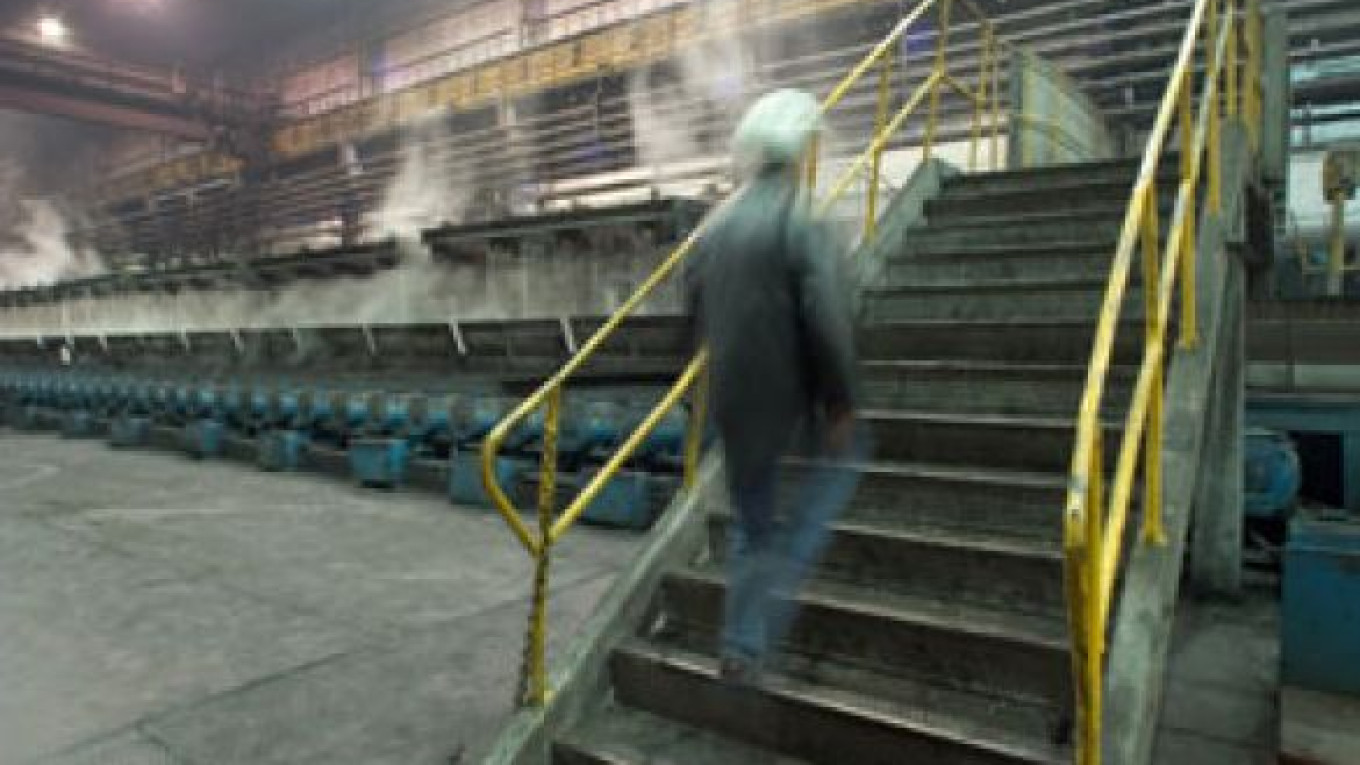Severstal said Tuesday that net income nearly doubled to $368 million in the third quarter from the preceding three months, allowing the country's largest steelmaker to resume dividends halted during the crisis.
The company was Russia's first major steel producer to report for the third quarter, and the better-than-expected profit may bode well for rival producers. Analysts had expected Severstal profit at $309 million for the quarter, according to a Bloomberg survey. Net income was $192 million in the second quarter.
“We still see a strong performance of raw materials, which was beneficial for mining companies and companies with significant share of integration,” Alexei Kulichenko, Severstal's chief financial officer, said on a conference call with investors. Performance is expected to rebound further next year after a seasonal decline in demand in the fourth quarter, he said.
Steel prices have risen 25 percent to 30 percent this year, said Dmitry Smolin, a metals and mining analyst at UralSib. The Russian steel market is likely to outperform the world by growing 8 percent to 10 percent next year, while steel prices may increase by 10 percent to 15 percent.
Severstal's shares fell 3.4 percent on the MICEX, worse than the exchange's benchmark index of 30 stocks, which closed down 1.9 percent. The company's shares in London lost 3.6 percent.
The results were largely in line with the market's expectations and were unlikely to be contributing to the shares' decline Tuesday, said Andrei Tretelnikov, an analyst at Rye, Man and Gor Securities.
The stronger third quarter helped narrow Severstal's nine-month loss to $225 million, compared with a loss of $875 million in the same period last year, thanks to strong results from the raw materials segment, the company said in a statement.
Revenue in January through September increased by 43 percent to reach $11.3 billion, while earnings before interest, taxes, depreciation and amortization soared 416 percent to $2.2 billion, Severstal said.
Severstal said it had seen almost a double-digit growth in prices and production volumes “across all key product lines” in the first nine months of 2010, with coal sales increasing by 36 percent from last year and sales of iron ore pellets growing by 19 percent. ?
Third-quarter revenue fell 7.3 percent to $3.9 billion, and EBITDA slid by 21.4 percent to $751 million.
The decline was driven by seasonal weakening of steel demand and depositing $77 million in Senator Sergei Pugachyov's International Industrial Bank, whose license was revoked earlier this year, Kulichenko said.
Revenue also fell as Severstal idled Sparrows Point, a U.S. steel mill, in July.
Severstal had "certain challenges" in the U.S. market that forced it to idle the plant, Kulichenko said. Permanently idling mills is not "the right idea" and Severstal will “monitor the market and see when it's the right time to restart it," he said.
Severstal's North American division reported a negative EBITDA of $59 million for the third quarter because of “lower prices, higher raw material prices and Sparrows Point idling,” VTB Capital said in a note.
“Given that the company has not announced plans to restart it in the fourth quarter, that would mean a further decrease in volumes which, along with the moderate outlook on prices … would lead to the loss increasing,” the note said.
But with operations elsewhere improving, Severstal was able to resume paying dividends for the first time in two years.
“We are pleased to be restoring the dividend. The third quarter was a good result in market conditions which continue to be challenging,” said CEO Alexei Mordashov, who is also the company's majority owner.
Severstal's board recommended paying 4.29 rubles (14 cents) per share for the first nine months of the year, or 25 percent of the profit in the second and third quarters, Severstal said in the report.
Shareholders are expected to approve the payout at an extraordinary meeting Dec. 20.
Following Severstal, most steelmakers are likely to demonstrate a decrease in EBITDA in the third quarter and show modest results in the fourth quarter, said UralSib's Smolin.
“Export prices for steel dropped by 10 percent to 15 percent in the third quarter and may be weaker in the fourth quarter,” he told The Moscow Times.
Given the strong performance of Severstal's mining division, companies focusing primarily on mining — such as Mechel and Novolipetsk Steel — are likely to demonstrate strong results, Smolin said.
Kulichenko said Severstal would continue to develop its existing mining projects and intends to open the new ones.? ?
Severstal was tight-lipped on the possible initial public offering of its Nord Gold unit, though Kulichenko said management was still considering the London listing. The London sale is “one of the options for the company in the short term,” Kulichenko said.
Gold has risen more than 23 percent this year and was trading Tuesday for about $1,350 an ounce.
“No final decision has been taken, so it would be incorrect to talk about any delays in the process. We are very carefully considering all options,” he said.
A Message from The Moscow Times:
Dear readers,
We are facing unprecedented challenges. Russia's Prosecutor General's Office has designated The Moscow Times as an "undesirable" organization, criminalizing our work and putting our staff at risk of prosecution. This follows our earlier unjust labeling as a "foreign agent."
These actions are direct attempts to silence independent journalism in Russia. The authorities claim our work "discredits the decisions of the Russian leadership." We see things differently: we strive to provide accurate, unbiased reporting on Russia.
We, the journalists of The Moscow Times, refuse to be silenced. But to continue our work, we need your help.
Your support, no matter how small, makes a world of difference. If you can, please support us monthly starting from just $2. It's quick to set up, and every contribution makes a significant impact.
By supporting The Moscow Times, you're defending open, independent journalism in the face of repression. Thank you for standing with us.
Remind me later.


